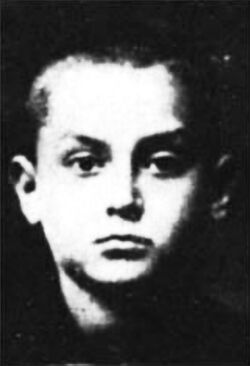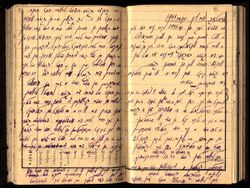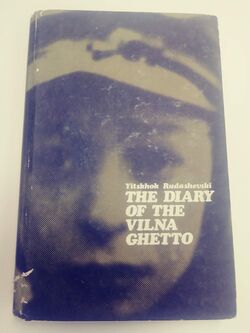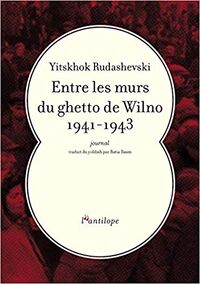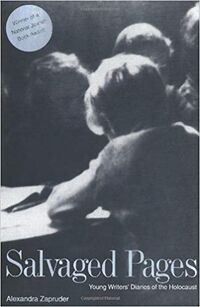Yitskhok Rudashevski (M / Lithuania, 1927-1943), Holocaust victim
Yitskhok Rudashevski (M / Lithuania, 1927-1943), Holocaust victim
- KEYWORDS : <Lithuania> <Vilna Ghetto> <Ponary>
- MEMOIRS : The Diary of the Vilna Ghetto (1968; ET 1973)
Biography
Yitskhok Rudashevski was born December 10, 1927 in Vilna, Lithuania. As a young Jewish teenager he lived in the Vilna Ghetto in Lithuania during the 1940s. He was shot to death in the Ponary massacre on Oct 1, 1943 during the liquidation of September–October 1943.
Book : The Diary of the Vilna Ghetto (1968; ET 1973)
- Originally published in Hebrew (Tel Aviv: ha-Kibuts ha-meuhad, 1968). English ed. The Diary of the Vilna Ghetto (Tel Aviv [Israel]: Ghetto Fighters' House, 1973). Also published in French (2016), and Lithuanian/Yiddish (2018).
Yitskhok Rudashevski wrote a diary from June 1941 to April 1943 (age 14-16), when living in the Vilna Ghetto. The diary, which detailed his life and struggles in the ghetto, was discovered by his cousin Sore Voloshin, in 1944. His cousin Voloshin fought the German army and the Soviet Union, later returning to the hideout, and found Yitskhok's diary.
"This is the diary of one of the "other Anne Franks," teen diarists of the Holocaust who are not nearly as famous as she. Yitskhok Rudashevski was fourteen when he began his diary in Vilna (Vilnius), Lithuania during the Nazi occupation. He was a gifted writer and wrote movingly of how his family and all the other Vilna Jews were confined to a ghetto and the ghetto kept shrinking and shrinking as the Nazis conducted "Aktions" and killed vast numbers of people, usually by machine-gunning them en masse at nearby Ponar. Rudashevski did not survive; he and his family went into hiding, but they were caught and almost all of them were executed. He was fifteen years old when he died. His account of the suffering of the Vilna Jews, and his own struggle to remain human amid the disaster, is well worth reading."--Publisher description.
Book : We Are Witnesses (1995), by Jacob Boas
- Jacob Boas, We Are Witnesses: Five Diaries of Teenagers Who Died in the Holocaust (New York, NY: Henry Holt, 1995).
"The five diarists in this book did not survive the war. But their words did. Each diary reveals one voice, one teenager coping with the impossible. We see Dawid Rubinowicz struggling against fear and terror. Yitskhok Rudashevski shows us how Jews clung to culture, to learning, and to hope, until there was no hope at all. Moshe Flinker is the voice of religion, constantly seeking answers from God for relentless tragedy. Éva Heyman demonstrates the unquenchable hunger for life that sustained her until the very last moment. And finally, Anne Frank reveals the largest truth they all left for us: Hitler could kill millions, but he could not destroy the human spirit. These stark accounts of how five young people faced the worst of human evil are a testament, and an inspiration, to the best of the human soul."--Publisher description.
Book : Salvaged Pages, by Alexandra Zapruder (2002)
- Alexandra Zapruder, Salvaged Pages: Young Writers' Diaries of the Holocaust (New Haven, CT: Yale University Press, 2002).
"Presents excerpts from the Holocaust diaries of fifteen young people, ranging in age from twelve to twenty-two, each with an introductory essay that looks at the writer, and the historical context of the diary, with a study of the text and its relevance in the context of Holocaust history or literature. Includes a list of over fifty additional known diaries written by young people during the period."--Publisher description.
Museum of Tolerance
Yitskhok was the only child born to Rose and Elihu Rudashevski. Yitskhok's father worked as a typesetter for a well-known Yiddish newspaper. His mother worked as a seamstress. Yitskhok had a relatively comfortable childhood. He was part of a large, closely-knit and loving family. He lived in Vilna, the capital of Lithuania. Vilna had a large Jewish population and was a world center for Jewish culture and learning. In 1941, the city was home to over 80,000 Jews. Yitskhok completed one year of high school at the prestigious Realgymnasium. He was a good student and his favorite subjects were literature and history. He loved to read, and wrote as often as he could in his diary. He went hiking or to camp with his youth group.
When the Germans invaded Vilna in June 1941, Yitskhok was fourteen years old. The Germans immediately set about persecuting the city's Jews, and in July, took 35,000 men, women, and children to the Ponary forest, about 10 miles outside Vilna. Forced to dig their own graves, the Jews were massacred. In September, the remaining Jews were herded into two overcrowded, sealed-off ghettos. The smaller one was closed 46 days later, after its residents were murdered. Conditions were horrible in the remaining ghetto. There was little food, poor sanitation, and the residents were subject to random Nazi brutality and periodic roundups. Despite these conditions, underground cultural events were organized, newspapers were published, and various social welfare groups continued functioning. Yitskhok attended a clandestine school for two years. He joined various clubs including one that collected folklore. He continued to write in his diary, describing life in the ghetto.
The destruction of Vilna's Jewry continued, as the Nazis rounded up Jews and murdered them in the Ponary forest. A strong underground resistance group was formed, gathering weapons and planning for the defense of the ghetto. After the group was betrayed, many of its members escaped to the forest. In August 1943, as a prelude to their plan to empty the ghetto, the Nazis began sending the remaining Jews to Estonia. In September 1943, the Germans decided to murder those who were left. Yitskhok and his parents moved to a "hideout" in the attic of his uncle's home. They hid there with his uncle's family , along with five other people, for two weeks. In early October 1943, the Germans discovered the hideout. Sixteen year-old Yitskhok and the others were taken to the forest and murdered. One of Yitskhok's cousins managed to escape the massacre and joined the partisans in the surrounding forests. He returned to Vilna after the war and found Yitskhok's 204-page diary.
